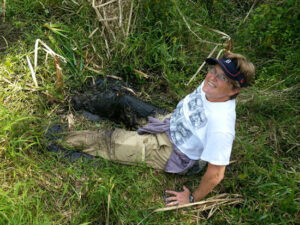Kris’s Call to Action on Climate Change

As Kris Olsson retires from HRWC after 31 years as one of our lead ecologists she leaves behind a legacy of extraordinary leadership, dedication, and passion for the protection of nature. This blog overview’s Kris’s top 6 ways to take action on climate change. It is republished from our Spring 2024 Huron River Report, celebrating of Kris’s retirement
In my 31 years at HRWC, there have been times of great inspiration such as the passage of conservation millages in Washtenaw County and Ann Arbor, Scio, and Webster townships in 2000. But the bulk of the time, it feels like we are toiling away while “Rome burns.” The “crisis of the day,” as well as the long-term, creeping disasters, have accumulated. In the 1990s, we were fighting to limit the dioxane plume seeping underground through Scio Township (and now into Ann Arbor), finding and stopping illicit sewer connections to the river (a great success story and the reason the Huron is clean enough for the recreational activities we enjoy today). In the 2000s, concern peaked over the continued conversion of farmland, forests, and wetlands into sprawling shopping malls, subdivisions, and big box stores. This was and continues to be a wicked, complicated problem with unclear solutions.
Sounding the alarm
Today, climate change overshadows all that we do and see in our world of watershed protection. This enormous, multi-dimensional problem has crept along over the last half-century. Now, even with its dire consequences evident, we still can’t seem to gain traction to avoid catastrophe. The age of the “6th Extinction” is now upon us. Here are some alarming facts to add to your plate of environmental anxiety:
- Over 500 species of land animals are nearly extinct, with most predicted to be gone within twenty years. The same number went extinct over the whole of the last century.
- We are in the grip of an “Insect Apocalypse” with drastic declines of insect populations across the globe1.
- The number of birds in North America has dropped by 29% (3 billion birds) in the last 50 years2.
- Today livestock make up 60%, humans 36%, and wild animals just 4% of total mammal biomass on Earth.
Finding hope through action
Despite the grim news, we can still make a big difference! Here is a count-down of my top six calls to action:
6. Plant trees and native landscapes
Forest and ecosystem restoration is one of the most impactful individual actions we can take to help mitigate climate change. Bonus: trees absorb stormwater, curb air pollution, and cool down urban heat islands. Through a grant awarded by the Michigan Department of Natural Resources, you can get a discount on trees that are good for rivers and streams when you purchase them from the Washtenaw and Oakland County Conservation Districts! HRWC.org/calendar, HRWC.org/landscaping
5. Electrify and weatherize
To meet President Biden’s ambitious climate goals, over the next three years residents and businesses must install 14 million more electric appliances than we are at the current rate. The Inflation Reduction Act offers abundant subsidies to help us. Good for the planet AND our bottom line. Rewiring America has all the information you need. rewiringamerica.org
4. Talk to friends and family
Much of the public is woefully unaware of these issues. It’s up to us to talk about climate change as part of our regular interactions with friends and family. The Climate Reality Project will train you how to give climate change presentations that work. Join me at their local chapter. climaterealityproject.org
3. Get involved with local government
This is where the action is! Policies that protect forests and wetlands, make our neighborhoods walkable (and/or protect our rural character), and help the U.S. meet its climate goals at the local level. HRWC’s Change Makers program will help you get involved. Nearly a dozen folks who took our Change Makers Boot Camp are now elected or appointed local government officials. HRWC.org/changemakers
2. Write to, meet with, and yes, lobby your government officials
Guess what? Politicians need your vote, so they are in fact ready and willing to listen. Those phone calls, letters, and meetings work! Citizens Climate Lobby will teach you how to build relationships with your elected officials and make them aware that there is a constituency that wants and needs climate action. Join me at their local chapter. annarborccl.org
1. Vote!
The Number One action you can take is to vote. Vote in every race, not just the presidential ones. Vote in state-level races. Michigan has passed some of the most progressive climate action legislation in the country largely due to climate groups getting out the vote for pro-climate action candidates. Vote at the local level, too! In Ann Arbor, voters elected a new slate of city council members who supported climate action. As a result, the nationally recognized A2ZERO Plan received the funding it needed to move forward.
I volunteer with the Environmental Voter Project where we remind environmentally minded folks to vote. environmentalvoter.org. Join me!
—Kris Olsson
References:
1.NY Times, Book Review, 3/5/2022 When did you last clean bug splatter off your windshield?
2. NY Times, Science, 9/19/2019 Bird populations: America and Canada.
Please consider contributing to the Watershed Resilience Endowment Fund and join Kris’s fight for the protection of our watershed and river forever. Help us honor Kris’s thirty-one-year legacy as she retires from HRWC.



